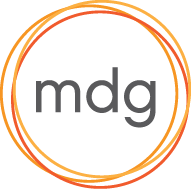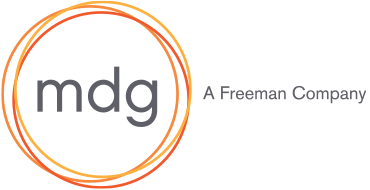
AI tools like ChatGPT and Gemini are rapidly changing how people discover events, generating leads and inquiries without traditional website clicks. In this new “zero-click” landscape, optimizing your content for both audiences and AI models is becoming essential. At mdg, we’re already seeing leads attributed directly to Large Language Models (LLMs), underscoring their growing influence in event discovery. If your event isn’t surfacing in AI-driven recommendations yet, now is the best time to explore strategies for increasing your visibility in these emerging channels.
The Strategic Challenge
LLMs like ChatGPT are rapidly becoming the new search engines because they give you an answer (as opposed to traditional search, which gives you lots of answers you need to click on). Exhibitors, attendees and sponsors are using AI to discover what’s worth their time and budget.
But here’s where it gets complex: optimizing for AI requires a fundamental shift in how you structure, present and distribute your content across multiple touchpoints, with technical requirements and ongoing optimization far more sophisticated than traditional SEO.
What ‘LLM-Ready’ Really Means
Think of AI models as incredibly sophisticated but demanding research assistants. They need content that’s not just well written but strategically structured for machine interpretation. This means:
- Content Architecture: Your information needs to be organized in ways that AI can easily parse, understand and contextualize against competing events.
- Authority Signals: LLMs prioritize content from sources they deem credible and comprehensive. Building this authority requires strategic placement across multiple platforms and careful attention to technical indicators that signal trustworthiness.
- Semantic Optimization: Beyond keywords, your content needs to demonstrate clear relationships between concepts, audiences and value propositions in ways that AI can understand and recommend appropriately.
- Ongoing Updates: LLM optimization requires continuous testing and adjustment as these models evolve and change their ranking factors.
The Strategic Considerations
Effective LLM optimization involves several interconnected elements that require coordination:
- Multi-Platform Strategy: Your content needs to perform across various AI training sources — from your own website to Wikipedia, industry publications and partner sites. Coordinating this ecosystem requires careful planning and execution.
- Technical Implementation: From schema markup to crawl permissions, the technical foundation needs to be precisely configured. Small errors can render your entire optimization effort invisible to AI systems.
- Content Depth vs. Accessibility: AI models favor comprehensive, authoritative content, but it must remain accessible to human readers. Striking this balance requires a sophisticated content strategy.
- Competitive Intelligence: Understanding why certain events get recommended over others requires deep analysis of content structures, authority signals and positioning strategies that may not be immediately obvious.
- Performance Measurement: Traditional analytics don’t capture zero-click engagement. New frameworks for measuring AI-driven visibility and attribution can help bridge this gap.
Seizing the AI Opportunity
The window for early-mover advantage is closing rapidly. Events that establish strong AI visibility now will benefit as these systems become more central to how people find and choose events. However, success goes far beyond ad-hoc efforts — it calls for coordinated expertise in content strategy, technical optimization, competitive analysis and performance measurement, all tailored to AI recommendation systems. Those who start early will be best positioned to lead as the digital landscape evolves.
A version of this article originally appeared in PCMA Convene.

